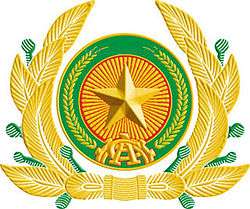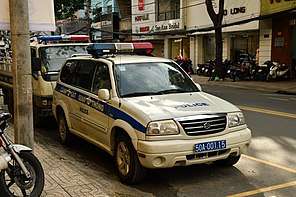Vietnam People's Public Security
The People's Public Security of Vietnam (Vietnamese: Công an Nhân dân Việt Nam) is the main police and security force of Vietnam, under control of the Ministry of Public Security. It is a part of the Vietnam People's Armed Forces and under the de facto control of Communist Party of Vietnam. This force was created on 19 August 1945. It is composed of 2 service branches, the Vietnam People's Security Force and the Vietnam People's Police Force.
| Vietnam People's Public Security Công an Nhân dân Việt Nam | |
|---|---|
 Emblem of Vietnam People's Public Security | |
| Agency overview | |
| Formed | August 19, 1945 |
| Jurisdictional structure | |
| Operations jurisdiction | Vietnam |
| General nature | |
| Elected officer responsible |
|
| Parent agency | Ministry of Public Security |
| Child agencies |
|
| Notables | |
| Significant operation |
|
| Anniversary |
|
| Website | |
| www | |
| March : We are the policemen (authored by Professor Trọng Bằng) colors : Yellow Red Green | |
Functions and branches
The People's Public Security of Vietnam has two branches:
- Vietnam People's Security
- Prevent, investigate, and defeat potential actions against enemies of the Vietnamese nation and that can endanger national security.
- Intelligence working.
- Joining forces in internal political security, economical security, ideology-cultural security, network security and information security with other uniformed bodies as established by law.
- Manage entrance or exit visas, border security crossing and checkpoints, and immigration stations in airposts, as well as in securing foreigners and Vietnamese expats in their visits to the country.
- Defending the secretcy of the Government of the Republic against external and internal threats
- Helping to build personal security in every kind of life, at every area in the country.
- Performing other duties, missions and responsibilities in keeping with the law.
- Vietnam People's Police (including Civil Defence forces)
- Working to prevent, investigate and solve environmental, political, traffic, functional and corruption-related criminal activities in keeping with the laws of the Socialist Republic
- Working with the general public on crime prevention and in participation in its actions
- Perform responsibilities and duties pertaining to:
- Identification security
- Public security
- Transport security
- Road and highway safety
- Firefighting
- Civil defence
- Disaster preparedness and response
- Execute other duties and missions in accordance with the Constitution and the laws of the Socialist Republic of Vietnam.
These two forces are trained mainly at two institutions, the People's Police Academy of Vietnam and the People's Security Institute of Vietnam.
Tasks and powers of the People's Public Security Forces
- To collect information, analyze, evaluate and predict situation and propose the Party and the State to promulgate and direct the implementation of guidelines, policies, laws and strategies on protection of national security and maintenance of social order and safety. To propose the combination of requirements of the strategies on protection of national security and maintenance of social order and safety with those strategies and policies on socio-economic construction and development, national defense and the State's external relations.
- To protect the freedom rights, democracy, life and property of the people; to protect high-ranking leading officials of the Party and the State and foreign guests; to safeguard important events, targets and key projects of national security, foreign representative offices, representatives of Vietnam-based international organizations, individuals holding or closely related to state secrets.
- To receive and process reports and denouncements on crimes, initiate criminal lawsuits and investigate crimes, and perform other judicial tasks according to the provisions of law.
- To sanction administrative violations and apply other administrative handling measures as provided for by law.
- To guide, inspect and examine agencies, organizations and citizens in performing the task of protecting national security and maintaining social order and safety; to conduct the law propagation, dissemination and education and build up "the whole population protects the Fatherland's security" movement.
- To apply masses mobilization, legal, diplomatic, economic, scientific-technical, professional and armed measures to protect national security and maintain social order and safety.
- To use weapons, supporting tools and necessary technical and professional means in attacking crimes and making self-defense according to the provisions of law.
- In case of necessity, to issue decisions on or propose the suspension or termination of operations of agencies, organizations or individuals which are detrimental to national security, social order and safety; to requisition means of transport, communication equipments and other technical means of agencies, organizations, individuals and operators or users of such means according to the provisions of law.
- To request agencies, organizations or individuals to coordinate in activities and supply information related to national security, social order and safety.
- To closely coordinate with the People's Army, Self-Defense and Militia Forces and state agencies in protecting national security, maintaining social order and safety, and defending the national independence, sovereignty, unity and territorial integrity.
- To research and apply modern scientific and technological achievements in protecting national security and maintaining social order and safety.
- To build up the forces of political, ideological, organizational and professional cleaness and strength.
- To enter into international cooperation on protection of national security and social order and safety.[1]
The organisational system of the People's Public Security Forces
- The organisational system of the People's Public Security Forces is composed of:
- Ministry of Public Security;
- Public Security Departments of municipalities and provinces
- Public Security Offices of rural districts, urban districts, towns and provincial cities;
- Public Security Posts of communes, wards and townships.

A Ho Chi Minh City Police Traffic Patrol Vehicle
Department of Public Security of municipalities
- Hanoi Public Security Department
- Ho Chi Minh City Public Security Department
- Hai Phong Public Security Department
- Da Nang Public Security Department
- Can Tho Public Security Department
Ranks of the People's Public Security of Vietnam
Student Policewomen at Ho Chi Minh Museum, Hanoi, Vietnam. June 2009
High-ranking officers (Army Forces)
- General (Đại tướng) – only held by Minister of Public Security.
- Colonel General (Thượng tướng) – usually held by Deputy Ministers of Public Security.
- Lieutenant General (Trung tướng) – usually held by Director Generals of General Department, Director General of Hanoi Police Department, Director General of Ho Chi Minh City (HCMC) Police Department.
- Major General (Thiếu tướng) – usually by Vice Director Generals of General Department and Directors of Department and Chiefs of Provincial Police.
Middle-ranking officer
- Senior Colonel (Đại tá) – usually held by Vice Directors of Department and Chiefs of Provincial Police.
- Colonel (Thượng tá) – usually held by Chiefs of District Police and Chiefs of Division.
- Lieutenant Colonel (Trung tá) – usually held by Chiefs of Ward Police and Chiefs of Police Team.
- Major (Thiếu tá) – usually held by Vice Chiefs of Police Team.
Low-ranking officers
- Captain (Đại úy)
- Senior Lieutenant (Thượng úy)
- Lieutenant (Trung úy)
- Second Lieutenant (Thiếu úy)
Non-commissioned officers
- Sergeant Major (Thượng sĩ)
- Sergeant (Trung sĩ)
- Corporal (Hạ sĩ)
Enlisted personnel
- Private First Class, Senior Constable, Firefighter 1st Class (chiến sĩ bậc I)
- Private, Constable, Firefighter (chiến sĩ bậc II)
References
- "Law on people's public security forces, Chapter 1". Vietnam Ministry of Justice. 29 November 2005. Retrieved 25 February 2017.

External links
![]()
- Official website (in Vietnamese)
This article is issued from Wikipedia. The text is licensed under Creative Commons - Attribution - Sharealike. Additional terms may apply for the media files.


